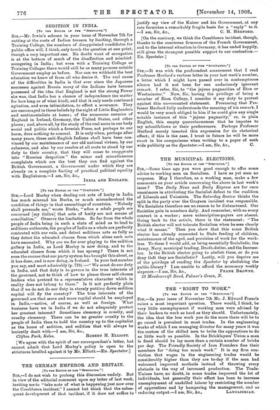[To THE EDITOR OF THE " SPECTATOR. "] SIR,—Lord Morley when
dealing out acts of lenity in India has much misread his Burke, or much misunderstood the condition of things in that assemblage of countries. "Nobody shall persuade me," wrote Burke, "when a whole people are concerned [my italics] that acts of lenity are not means of conciliation." Observe the limitation. So far from the whole people of India being in such a state of mind as to lead to seditious outbursts, the peoples of India as a whole are perfectly contented with our rule, and detest seditious acts as fully as they detest the educated classes from which alone such acts have emanated. Why are we for ever playing to the sedition gallery in India, as Lord Morley is now doing, and to the educated classes from which it has sprung ? There is not even the excuse that our party system has brought this about, as it has done, and is now doing, in Ireland. In your last number you say, and most admirably (p. 718) :—" We must do our duty in India, and that duty is to govern in the true interests of the governed, not to think of how to please those self-chosen leaders who pretend to a representative character which in reality does not belong to them." Is it not perfectly plain that if we do not do our duty in sternly putting down sedition capital will fly the country? The true interests of the governed are that more and more capital should be employed in India,—native, of course, as well as foreign. What business have we in India if we do not adequately protect her greatest interest? Sometimes clemency is cruelty, and cruelty clemency. There can be no greater cruelty to the people of India than to hold the country up to the capitalist as the home of sedition, and sedition that will always be leniently dealt with.—I am, Sir, &u., [We agree with the spirit of our correspondent's letter, but cannot admit that Lord Morley's policy is open to the strictures levelled against it by Mr. Elliott.—ED. Spectator.]










































 Previous page
Previous page